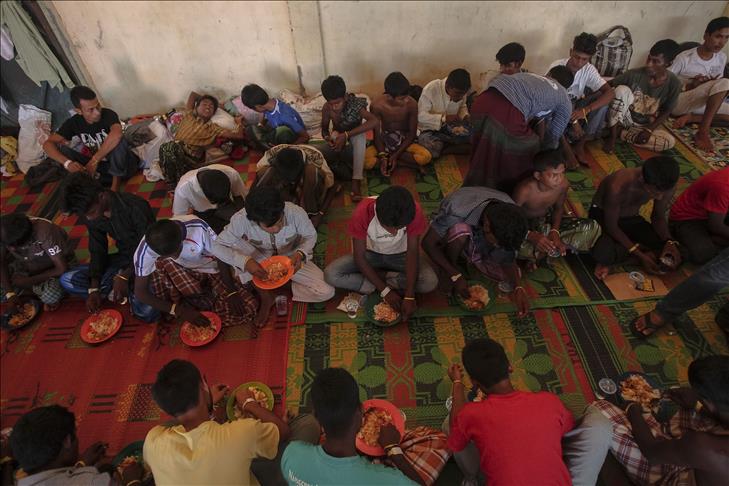
By P Prem Kumar and Ainur Rohmah
KUALA LUMPUR/JAKARTA
Malaysia and Indonesia's foreign ministers announced Wednesday that they would shelter thousands of Rohingya and Bangladeshi migrants currently stranded on boats on the Andaman Sea - but only if the international community agrees to then resettle them after one year.
Speaking to media after three-way talks on the crisis with their Thai counterpart, Malaysia's Datuk Seri Anifah Aman and Indonesia's Retno Marsudi Anifah said the two countries had agreed to offer temporary shelter to "irregular migrants" providing others then step in.
"In the meantime, Malaysia and Indonesia invite other countries in the region to join in this endeavor," Aman told reporters.
There was no indication that other countries had agreed to the deal, or when the “sheltering” would begin.
On Wednesday, however, President Recep Tayyip Erdogan did talk with Malaysian Prime Minister Najib Razak in a phone conversation, during which he offered humanitarian aid, according to a statement from his office.
"Turkey is ready to do its part and help these people," Erdogan was quoted as saying.
He also guaranteed that Turkey would pay $1 million to support aid activities by the International Organization for Migration (IOM) and the United Nations High Commissioner for Refugees (UNHCR).
The Turkish foreign ministry later said in a statement that it was exploring ways of organizing a humanitarian aid operation to reach Rohingya and Bangladeshi stranded at sea.
An IOM spokesperson recently told Anadolu Agency that Turkey is already one of the organization’s largest sponsors.
Since Thailand launched a crackdown on trafficking in its southern region May 1, boatloads of the migrants have been turning up on Thai, Indonesian and Malaysian shores, while many more remain at sea.
Some of the estimated 7,000 Rohingya Muslims and Bangladeshis have been taken in, emaciated passengers whisked to hospitals and holding centers, but of late the navies of the three countries have been turning the vessels back to sea after providing them with food and water.
On Wednesday, the UNHCR urged Southeast Asian governments to expand avenues for safe and legal migration, increase efforts to prosecute traffickers and smugglers for their crimes, and put in place dedicated measures to combat xenophobia and discrimination against any group.
"Time is running out for stranded boat people; the UNHCR urges Southeast Asian governments to act," spokesperson Adrian Edwards said in a press conference at the UN in Geneva.
Meanwhile, the U.S. State Department said Washington is "prepared to take a leading role" in the multicountry resettlement effort led by the UN's refugee agency. The U.S. has so far resettled more than 1,000 refugees during the current fiscal year that began Oct. 1 and provided nearly $109 million in humanitarian aid during that time, according to spokeswoman Marie Harf.
Many of the boat's Muslim occupants have fled Myanmar's western Rakhine state alleging brutality by the country’s military leaders, some have left refugee camps in Bangladesh’s Cox Bazar region, while others claim to have been forced onto the boats by people smugglers – ransoms then demanded from their families back home for their safe passage.
Antony Blinken, the State Department's number two, will travel Thursday to Myanmar where he will urge the country's leaders to cooperate with Bangladesh "particularly to rescue and provide immediate relief to migrants adrift", Harf said.
"I think the deputy secretary will emphasize the need for the Burmese government to assume responsibility for these longstanding issues in Rakhine state, including addressing the conditions facing the Rohingya population,” she said. “And I think will urge also some full and unhindered access to humanitarian assistance there as well."
Malaysian Foreign Minister Aman said Wednesday that his country would issue immediate instruction to maritime authorities to provide humanitarian assistance to the migrant boats.
Indonesia's vice president, meanwhile, told reporters in Jakarta that the government would now accommodate Rohingya and asked the army not to expel them.
"In the early policy we refused them, but now we will not," Jusuf Kalla said Wednesday.
Despite not participating in the offer, Thai Foreign Minister General Tanasak Patimapragor did join his counterparts on Wednesday in strongly condemning people smuggling and human trafficking.
The trio agreed to resolve the influx of irregular migrants in the spirit of Association of Southeast Asian Nations (ASEAN) solidarity.
There was no mention in the statement, however, ofMyanmar.
Earlier Wednesday, the country's government announced it was "deeply concerned" about the "life-threatening" conditions faced by thousands of its migrants stranded at sea.
The statement carried by state media marked a shift in the government's rhetoric.
It has previously denied involvement in the crisis, a seniorMyanmar official lashing out at mounting international pressure for it to join the talks.
U Zaw Htay - a director at the Myanmar president’s office - has claimed the problem is down to human traffickers and corrupt officials.
Indonesia, Thailand and Malaysia are not signatories to the 1951 United Nations Refugee Convention that would oblige it to resettle a certain number of refugees.
Since 2012, Rohingya -- who the United Nations consider to be the world’s most persecuted ethnic minority -- have been fleeing Myanmar in droves, in fear of violence that some human rights groups consider to be state-sponsored.
*Anadolu Agency correspondents Ilhan Toprak and Satuk Bugra Kutlugun, Fatih Erel, Joshua Carroll and Michael Hernandez contributed to this story from Ankara, Geneva, Yangon and Washington respectively.
Anadolu Agency website contains only a portion of the news stories offered to subscribers in the AA News Broadcasting System (HAS), and in summarized form. Please contact us for subscription options.







